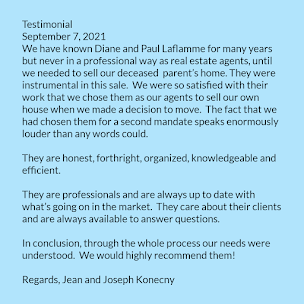Despite Challenges, Canada’s Generation Y Still Plan to Own Homes, According to Royal LePage National Survey
New mortgage regulations and current home prices seen as obstacles by
Generation Y
TORONTO, ON, March 20, 2013 – Although there are
genuine hurdles to owning a home for Canadians, a new Royal LePage Real
Estate survey shows that Generation Y (born between 1980 and 1994) and
Baby Boomers (born between 1947 and 1966) still strongly desire a house
of their own.The survey conducted by Leger Marketing found that four-in-five (80.9 per cent) of the Generation Y sample indicated that they have plans to move to another primary residence at some point in the future, with significant proportion (39 per cent) stating that they have a move planned at some point in the next two years. Baby Boomers were less interested in moving, with 56.6 per cent stating that they currently have no plans to move to another residence.
“Baby Boomers have built homes for themselves. They are established in their neighbourhoods and their residences have become a place of happiness for family and friends,” said Phil Soper, CEO of Royal LePage Real Estate. “It’s their children that are seeking to create a similar atmosphere of their own, even though new impediments exist for this younger generation.”
While Generation Y is more likely to rent their primary residence at this stage in their lives, they do not see this as desirable long-term solution. An overwhelming 85.7 per cent disagreed with the statement that “I do not desire to own a property in my lifetime as renting is preferable to me,” including 90.5 per cent of Quebecers. British Columbians in the same age group were among the most open to renting, with one-in-five (21.4 per cent) saying they prefer renting over home ownership.
Of those who are planning a move, 55.1 per cent of Generation Y and 60.1 per cent of Baby Boomers intend to purchase their next primary residence. While the majority prefers to purchase their next home, a sizeable proportion of Generation Y (32.6 per cent) says they plan to rent. When examined regionally, there are some interesting divergences in intentions on buying versus renting. For instance, Generation Y in the Prairies and Quebec (62.6 and 61.3 per cent, respectively) intend to purchase their next primary residence. On the other hand, British Columbians in the same age group are less likely to become home buyers, with 38.3 per cent stating that they intend to rent their next primary residence.
Regardless of intent to move or not, Canadians remain confident in the sturdiness of the real estate market. Trust in the value of real estate remains very high amongst Canadians young and old. The majority of respondents from both groups stated that they see real estate as a sound investment, including 80.3 per cent of Generation Y and 88.7 per cent of Baby Boomers. Only approximately one-in-ten (8.5 per cent and 12.8 per cent, respectively) from either group did not believe that real estate was a sound investment.
“Across locations and ages, Canadians are investing in their future and they see value in real estate,” said Soper.
While interest in home ownership remains high, potential home buyers from Generation Y face a number of regulatory and financial barriers. For instance, the survey found discontent among Generation Y about recent changes made to mortgage rules. Just under half of respondents (45.8 per cent) said that the new rules will affect their ability to purchase a home to some or a large extent. A much smaller proportion (20.8 per cent) of Baby Boomers was concerned about the effect of the recent regulatory changes to mortgages.
Home affordability was also seen by many as a major challenge standing in the way of home ownership by both Generation Y and Baby Boomers. When asked, 72.4 per cent of Generation Y and 67.8 per cent of Baby Boomers agreed with the statement “I desire to own a property in my lifetime, but I am pessimistic about my ability to own a home because of the current house price affordability.” British Columbians of Generation Y were particularly pessimistic, with 86.1 per cent agreeing with this statement. Quebecers were more optimistic with 39.9 per cent disagreeing with this statement.
Down payments on real estate also represent a challenge to Generation Y homebuyers, many of whom are entering the real estate market for the first time. Almost two-thirds (63.8 per cent) of Generation Y respondents plan to put down less than 20 per cent as a down payment on a new property. The majority of funds for down payments from Generation Y homebuyers (an average of 67 per cent) will come from a combination of savings, RRSP contributions and gifts from family. On average only 27 per cent of the funds for a Generation Y down payment will come from a sale of the current residence. The trend is opposite for Baby Boomers, where almost three-quarters (73 per cent) of their down payment will come from the sale of their current residence.
Royal LePage Baby Boomer and Generation Y Survey
|
||
Generation Y (1980 – 1994)
|
Baby Boomers (1947 – 1966)
|
|
| Do you plan to purchase or rent your next primary residence? |
||
Purchase
|
55.1%
|
60.1%
|
Rent
|
32.6%
|
18.0%
|
Other
|
0.8%
|
3.2%
|
Don’t know
|
11.5%
|
18.7%
|
| To what extent have the new mortgage rules affected your ability to purchase a home? |
||
To a large extent
|
12.5%
|
6.9%
|
To some extent
|
33.3%
|
13.9%
|
To a little extent
|
17.4%
|
9.4%
|
To no extent at all
|
14.0%
|
65.8%
|
I don’t know/prefer not to answer
|
22.8%
|
4.0%
|
| How strongly do you
agree or disagree with this statement? “I desire to own a property in my
lifetime, but I am pessimistic about my ability to own a home because
of current house price affordability.” |
||
Strongly disagree
|
7.4%
|
12.3%
|
Somewhat disagree
|
16.4%
|
13.9%
|
Somewhat agree
|
44.2%
|
36.4%
|
Strongly agree
|
28.3%
|
31.4%
|
I don’t know/prefer not to answer
|
3.8%
|
6.0%
|






